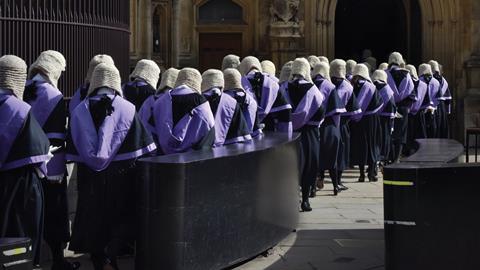There is no direct evidence that a controversial selection process for recruiting judges is discriminatory, an independent review has concluded – however, the findings reveal worrying inconsistencies that will fuel widespread concerns that the selection tool is unfair.
Last year the chair of the Judicial Appointments Commission ordered a review of the statutory consultation process in response to accusations that the commission had failed to do away with so-called ‘secret soundings’, whereby judges were selected on the basis of whether they found favour with colleagues.
The findings of the review, conducted by Work Psychology Group (WPG), were published today.
The review concluded that the operation of statutory consultation was generally consistent within a judicial recruitment exercise. However, the evidence base for comments that were received was mixed. The absence of some statutory consultation comments for some candidates affected consistency, reliability and perceived fairness.
Reviewers also concluded that statutory consultation comments received prior to a selection day can support the selection panel in making recommendations, but candidates are not given the chance to directly refute negative comments. The weight that statutory comments hold within the recruitment exercise is unclear to some judges. However, there was no 'direct evidence' that the comments had a disproportionate impact on certain groups based on the data included in the review.
Although the commission stresses that statutory consultation responses must be evidence-based, the review highlights some shocking responses. For instance, in a recorder exercise, some spoke about the frequency of the candidate having lunch with other judges or their childcare responsibilities. One comment referenced the extent to which the candidate engaged in daily physical activity as evidence of their perseverance and endurance.
In a detailed response, the commission said it will adopt a revised approach to statutory consultation for exercises from September, including dispensing with statutory consultation in certain circumstances.
The commission said the statutory consultation process will be considered on a case-by-case basis. Whether it is dropped will depend on the size and nature (fee-paid or salaried) of the recruitment exercise, the likelihood that consultees will have relevant information on candidates' suitability and for a significant proportion of the candidate pool, and the timing of when any statutory consultation could be sought.
Where statutory consultation is retained, comments will be sought prior to the selection day to guide areas to be probed at interview. Specific guidance will be issued on how statutory consultation evidence is collated, weighted and used.
The Law Society wants the statutory consultation process to be abolished.
Society president I. Stephanie Boyce said the commission should stop trying to justify a ‘failed’ process and engage with what it actually delivers. ‘There is no doubt that applicants from under-represented backgrounds are much less likely to be successful in making it through judicial selection,’ she said.
On the lack of direct evidence of disproportionate impacts, Boyce said: ‘No evidence doesn’t prove a thing. In fact, the WPG said it had not been provided with the data to enable it to reach a conclusion about the impact of statutory consultation.
‘We know a diverse pool of candidates is applying - not least from among the much more diverse solicitor profession. They’re just not making it through the process in the same numbers. It is time for the whole appointments system to be overhauled to deliver a more diverse judiciary.’
This artice is now closed for comment.




























9 Readers' comments